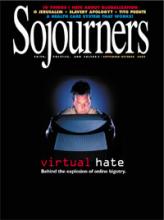Few cities in the world excite such passion as Jerusalem. Despite its sizeuntil the 19th century it was a tiny cityit is an unrivalled place for both Jew and Christians; and for Muslims it is Al Quds ("The Holy"), the third "holy city" after Mecca and Medina. How should Christians view this city, which lies at the center of their faith? How helpful is it to think of it as a "holy city"?
History, both ancient and modern, reveals that all too often this idea of holiness can become distorted and in fact be an excuse for behavior and political schemes that are far from holy. Jerusalem's powerful role as a religious symbol gets abused for political ends. People wrap their own identities around the city.
The possibility of somehow enjoying a greater proximity to God becomes enticing, giving people the desire to possess this city and so to have God on their side. Think of the Crusades.
But ponder too what is going on in the Middle East today as two rival nationalities, undergirded chiefly by Jewish and Islamic faith, compete to have Jerusalem at the heart of their national identity. Can the city be shared or will it be torn apart? Will Zion prove to be the home of righteousness, the place from which "justice flows out to the nations"? Or will Jerusalem reveal, as it has done before on significant occasions, that it is no different from anywhere elsean epitome of the "world"?
If as Christians we are sensitive to God's concerns, both for the good news located in Christ and for the spread of his kingdom-rule in justice and love, we will be concerned too to think rightly about the future of Jerusalem, this city at the heart of biblical faith. And we will be keen too to get a handle on these complex issues that relate to Zionism, the Palestinian issue, and the missionary task of the church in the Middle East.
Read the Full Article
